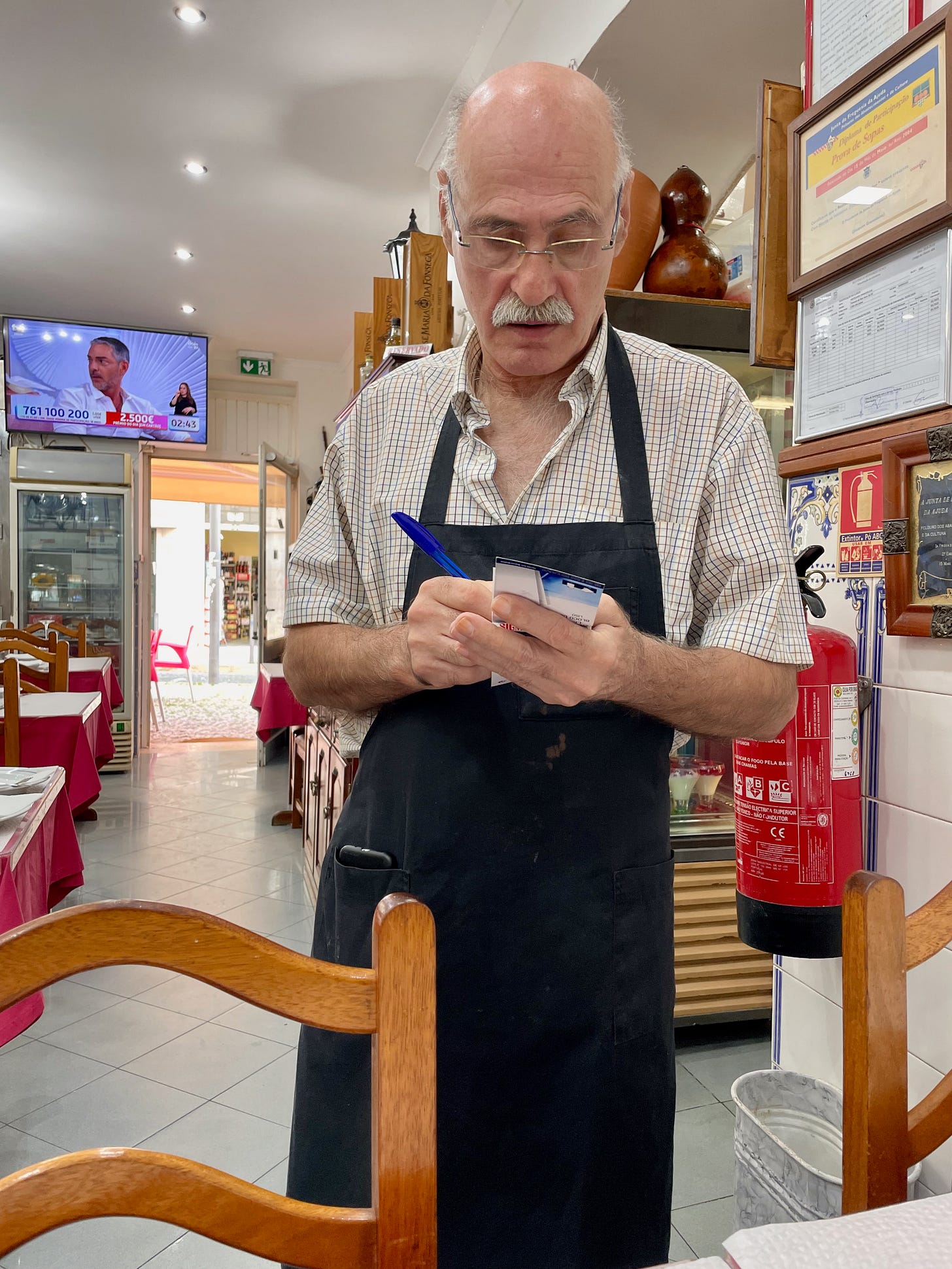Why the Hell Are You Speaking English to Me?
Negotiating language choice in service encounters
If you travel the world for long enough, you eventually find yourself in this situation: You walk into a restaurant, greet the staff and ask for a table in the local language, decline the English-language version of the menu, and place your order without seeking recourse to English… only to have your server keep switching back to English during every exchange, right through to the bill. This happens to me nearly every week here in Portugal, and I have had the same experience countless times in other countries. Those of us who are desperately trying to learn and make even token use of the local language keep getting rebuffed by people who seem to refuse not to speak to us in English. In such situations, it is very easy to get irritated and resentful. But... is that really justified? (dramatic pause with suspenseful music)
In this essay, I want to start exploring the question of how people choose which language to speak in a particular situation (what I am calling “negotiating language choice”), starting with the situation we are all probably most familiar with: the service encounter. I will focus mostly on restaurants, since that is a context in which one can find oneself multiple times per day. But similar things can happen in banks, pharmacies, post offices, tourist information centers, government agencies, buses, and so on—not to mention cafés, bars, wine bars, clubs, speakeasies, police detention cells, etc. The general question is this: Confronted with someone you have never spoken to, how do you choose which language to use when talking to them?
Clearly, if you are deeply monolingual (in English, obviously; otherwise you wouldn’t be reading this) then you don’t really have any other option than to use English, and will hopefully be grateful to anyone who offers to accommodate you. But most travelers do try to learn at least a smattering of the local language, understanding that it paves the way to improved interactions—or at least is supposed to.
Then there are those of us who have immigrated to a country for the long haul. We usually have a strong commitment to learning and using the local language, which becomes a part of our own identity as residents of the country. For this reason, when we run up against disagreement or conflict in language choice negotiation, we can easily become disgruntled. Hence the title of this essay: “Why the Hell Are You Speaking English to Me?” I have yet to say this to anyone, but I have certainly thought it.
Let’s go back to our restaurant example. Sometimes it goes like this: I sit down with an English-speaking but also Portuguese-speaking friend, we place our order in Portuguese, carry on a conversation between ourselves in English, and switch back to Portuguese every time the server shows up. The server, for their part, will sometimes happily use Portuguese, will sometimes use English and then clock that we are using Portuguese (and will sometimes even apologize), or will sometimes just plow ahead with English as though it were part of their job description. Why do different people act in different ways? It is very easy to assume that some people are rude, insensitive, lazy, unobservant, etc.—but I want to argue that the situation is much more complicated than that.
Let’s pull in a concept from psychology: the fundamental attribution error. This concept very usefully puts a label on a mistake that we humans make all the time: We prefer to attribute people’s behavior to their character rather than to the circumstances. An easy example is assuming that someone who is driving way too fast is a selfish jerk, rather than considering that perhaps they are on the way to the hospital with a woman about to give birth in the back seat. What makes this error a bit comical is that we typically only apply such reasoning to other people; we tend to give ourselves a huge break, happily citing circumstances that explain or excuse our behavior (“I was afraid the cake was about to spoil, so it seemed safest to eat it all.”).
Now we can apply this perspective to our restaurant scenario. Let’s flesh out the scene: Gregory and Frida are having dinner in a Portuguese restaurant called “Amar o Mar”, and their server is a woman named Paula. (This is all fictional, by the way, other than the existence of me. I believe that I exist. Substaco ergo sum.) When these two customers enter, Paula greets them in English and offers them menus in English. Gregory and Frida very politely reply in Portuguese and ask for Portuguese menus, but continue speaking to each other in English. Every time Paula comes back to the table, she is uncertain what language to speak. Sometimes she uses English, and sometimes she uses Portuguese. Why might that be?
Let’s assume that Paula is well-meaning, if underpaid. Are there situational factors that could condition her choice of language? My training as a linguist and my many years of living in different countries lead me to posit a whole range of potential factors. Let’s go through some of them.
First of all, what does Paula think when Frida and Gregory walk into the restaurant? She might think, “these people sure don’t look Portuguese” (and she would be right), and therefore could be justified in departing from the assumption that they don’t speak the language. She might also look at how they are dressed. I can guarantee that if a person walked into a place in Portugal wearing a baseball cap, a floral shirt, shorts, and Tevas, nobody would think they spoke Portuguese, and they would be right about 99.9% of the time.
Another thing that might affect Paula’s assessment is how comfortably and confidently Gregory and Frida started off the interaction in Portuguese. It’s one thing to say hello in the local language; it’s another thing to say it in just the way a local would say it, with the right pronunciation, prosody, and volume. And then there is the question of facial expression. I have seen plenty of well-meaning but terrified-looking German tourists saying things in acceptable Portuguese but looking like they are afraid of being sent back to Oberhausen-Reinhausen. This reduces their interlocutor’s confidence that the interaction will go smoothly.1
Then there are all of the factors related to the situation, including the languages currently in use and the languages that are normally used in the venue. Not long ago, I went to dinner accompanied by a Portuguese person at a restaurant serving traditional Portuguese food, and ordered in Portuguese. But the waitstaff kept addressing us in English, because most of their clientele are tourists. Therefore, even if the President of the Republic came to dine there, they would still be in English-language mode most of the time, and would have to keep snapping out of it, because English would always be the language they were speaking a moment before. So we can surmise that the language that is usually used—or even the language that is audible in the background—will have an influence on what someone expects to speak.
And of course, if Paula walks up to the table and hears Frida and Gregory speaking English with each other, can she really be blamed for addressing them in the same language? Whether she does it consciously or not, it makes perfect sense not to force a shift in language, and many people would probably appreciate it. So should Gregory and Frida really get annoyed when Paula fails to remember that they had started out in Portuguese?
And let’s focus on poor Paula for a moment. Maybe she secretly dislikes foreigners, but given that she works in an environment where there are lots of them, that seems somewhat unlikely. She may simply not be good at switching between languages, especially when she’s been working for several hours and is feeling tired. Maybe she never received any training in language negotiation when she learned her trade—I would be surprised if she had.
It could also be that Paula loves speaking English, fancies herself to be good at it, and is eager to show off her skills. Maybe the fact that English is the hot language to learn in Portugal now makes her feel special when she uses it, because of the status that it confers. Isn’t it nice to think that in addition to enjoying a good meal, you could make someone feel special by giving them a chance to use their English?
Conversely, when Lucilia, who has been working in the same restaurant for forty years, comes to the table, she may strongly disprefer speaking in English, which she never learned in school (French used to be the main foreign language taught). So any frustration felt by tourists who find that communication has suddenly become more difficult will certainly be mirrored in Lucilia, who didn’t used to need English at all.
So what’s a poor foreigner to do in service encounters? Here are some suggestions:
Perhaps the most obvious suggestion is to avoid restaurants that cater to tourists. If you want to speak like the locals, eat like them, too.
If you are learning the local language and would like to use it, try saying something along the lines of “I would like to practice my Portuguese/Korean/Swahili. Is that all right?” This will make an impression and may help your interlocutor to remember.2
If you are a bit more fluent, start out with a conversation. Ask the other person a question about the restaurant, or about the dishes on offer, or how long the restaurant has been there, or some other topic that will establish more firmly in their mind that you are someone who speaks their language.
If you really really don’t want anyone to address you in English, you might try avoiding using it within your own party. If that isn’t an option, you may just have to show some understanding for the linguistically confusing situation that results.
Conversely, if you don’t speak the local language and the other person accommodates you by speaking English, you might thank them for doing so, and compliment them on their English. This rarely goes over badly.
Finally, let us remember that not everybody you will meet in a service encounter in a particular country is from that country. What if it turns out that Paula is actually Italian and prefers speaking English because her Portuguese isn’t very strong? I confess that I do get irritated from time to time when I go to a restaurant in Lisbon and realize that the wait staff actually doesn’t speak any Portuguese—something that I am used to from Sweden (that is, not speaking Swedish), but which seems quite out of place here. But then I think about my server, who may be from Bangladesh, for example, and wonder what better employment opportunities they have in this country. From that perspective, while using English to order my cod with potatoes and eggs might feel odd, it’s really the least I can do for another human being who doesn’t have the same advantages I have.
So instead of thinking, “Why the hell are you speaking English to me?”, maybe it’s healthier to think “Maybe it will make you happy if I let you speak English to me.” There are certainly worse perspectives to take.
“Interlocutor” is a fancy linguistics term for “the person you are talking to”.
I am slightly tempted to try starting all service encounters in Portugal by saying “I’d like to practice my Korean. Is that all right? Oh, no? Well how about Portuguese then?”













We face this battle constantly and I have to say I find it very irritating. The victor is usually the language which everyone speaks best which can either be English or Italian, but to get to that conclusion takes a few skirmishes. We live half the year in Italy, I lived a decade in Rome; we are getting to the point that we speak well enough to be able to tell funny anecdotes in Italian - which is a pretty high level. We are way beyond the 1066 stage of restaurant ordering.
Most of the time we go into a bar it is evident that we speak easily well enough to order and there is a queue so all passes easily, but in restaurants we face the battle of the languages. I will refuse to back down and continue to speak Italian, Gianni (my English-Irish partner- that's the pseudonym we use for him Gianni Strainer - Jonny Foreigner) who is partly deaf and therefore doesn't speak Italian as well as quickly, will give way and let them speak English to us.
I think it is arrogant to come to a foreign country and expect others to speak English, without making an effort to speak the language. Having made the effort for decades I think is is rude to have the waiting staff refuse to speak Italian to us- we are clearly not struggling to communicate. Gianni on the other hand thinks it is rude to refuse to give the waiting staff the chance to practice their English.
My view is, firmly, that in a foreign country you make the effort for pleasantries at the very least - please, thank you, good morning, good bye, and if you speak the language then speak it and be allowed to speak it with imperfections .
However, two anecdotes. Once we were in Ravello in one of those super expensive ceramic shops. We had only just arrived and were staying in Villa Cimbrone- where Greta Garbo eloped to when she married- ie expensive. I started speaking Italian but tbh gave up as the owner, clued to our side, kept talking in English and Gianni indulged him. We said we would be back as we had only just arrived. As we left he pretended to speak to his collegue but went on a tirade about how rich people came to his shop and didn't even buy a wine stopper. It was highly offensive. I was steaming angry but Gianni stopped me saying something there and then.
The next day Gianni returned and the guy asked where I was as I had been interested in some platters. Gianni then informed him that I was offended, as I spoke perfectly good Italian and had understood every word of his abuse. The owner was mortified. MORTIFIED. He couldn't apologise enough and loaded Gianni with free stuff to reflect his embarrassment. Lesson - don't assume the English speaking people only speak English. I speak English, French and Italian. My kids- Brits- speak English, Italian, French, Spanish and Swedish, three of those fluently.
Second anecdote... none of the above applies in social gatherings. I used to be married to a Swede. Every time we went to Sweden, notwithstanding that every one spoke fluent English and I didn't speak a word , the conversations were in Swedish. For me this is plain rude.
The ramifications continue to this day. In the summer my daughter's plus one was isolated as he didn't speak Swedish and all the conversations were in Swedish. He's Belgium, but fluent in English, he only needed them to meet him half way. Presently the kiddies are with their plus ones (non Swede speakers) having Christmas with the whole Swedish family in English speaking South Africa. The biggest dread for my kids and their plushness is how to stop the Swedish family speaking Swedish and isolating their loved ones, when all the Swedes are fluent in English.
So for me;
When in Rome, speak Italian
When in mixed language company, speak the common language.
At the end of the day, language is about communication and good manner is about not making other people feel uncomfortable.
Great post, and a topic near and dear to my heart as a language nerd living in Portugal. I’ve been living in Portugal for over three years and I’m currently studying level B2 Portuguese although I would say my real-world speaking and understanding ability is probably at high B1.
My thoughts on the matter pretty much align with all of what you said. I’m never upset when someone speaks to me in English but I’m always curious about when and why people switch to English when I start out in Portuguese.
I would first add that as Portuguese has improved, the frequency of people speaking to me in English has steadily declined. And in general, I think people in Portugal are used to English speaking foreigners who have learned barely enough to eke out an A2 certificate and can’t really get much beyond initial greetings and make major errors, like my friend who ordered “chão gelado” to drink, or another one who ordered “água sem joelho”. At that point most Portuguese people are going to switch to English for obvious reasons.
Another thing that happens is that at least for me, I still have a fair amount of difficulty understanding spoken Portuguese in some situations, such as if there is a noisy background. In many cases a Portuguese person will switch to English when they sense I’m having difficulty and if it’s a service encounter I’m usually happy to do so. When I see a doctor who speaks English we usually speak English because it’s easier, although in simpler medical situations I’m fine speaking Portuguese.
One final thought, in my experience beginning language learners in general and even many language teachers don’t focus enough on pronunciation and intonation. Assuming you have a decent vocabulary, I think that bad pronunciation will create more problems in being understood than many types of grammar mistakes.